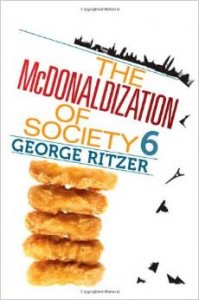 I know there’s a more recent update to this, the 20th Anniversary edition, but I happened upon #6 at McKay’s Books in Nashville, TN for a great price. Ray Kroc and McDonald’s weren’t the first to introduce this idea of rationalization into business processes. That distinction belongs to none other than Henry Ford. But the McDonald’s company perfected it. They’ve perfected it so well that many other companies across most industries have implemented some form of rational methods in their own systems. Project Managers rationalize the process of team-based work. I was intrigued because while it is good in some areas, this process can be detrimental to other areas. This book had a great structure to analyze what is happening. There are 4 dimensions around which he works through the issue – Efficiency, Calculability, Predictability, and Control.
I know there’s a more recent update to this, the 20th Anniversary edition, but I happened upon #6 at McKay’s Books in Nashville, TN for a great price. Ray Kroc and McDonald’s weren’t the first to introduce this idea of rationalization into business processes. That distinction belongs to none other than Henry Ford. But the McDonald’s company perfected it. They’ve perfected it so well that many other companies across most industries have implemented some form of rational methods in their own systems. Project Managers rationalize the process of team-based work. I was intrigued because while it is good in some areas, this process can be detrimental to other areas. This book had a great structure to analyze what is happening. There are 4 dimensions around which he works through the issue – Efficiency, Calculability, Predictability, and Control.
- Efficiency – the optimum method for getting from one point to another. In other words, it is the simplest, cleanest, fastest way to satisfy a customer’s need.
- Calculability – the quantitative aspects of products sold and services offered. Everything must be measured so that the final two dimensions can be used.
- Predictability – the assurance that products and services will be the same over time and in all locales. There’s a scene in the movie “The Memphis Belle” where Virgil is describing his idea for a franchised hamburger restaurant. Danny says, “Virg, no one is going to want the same old food everywhere they go!” Virgil simply replies, “Sure they will, it’s comforting.” Danny couldn’t argue with that and neither can we.
- Control – increased control of humans through the utilization of nonhuman technology. This technology encompasses machines, procedures and processes.
The book was excellent in its analysis but weak on solutions. The author spends a considerable amount of time setting up his thesis and then describing supporting data and anecdotes. It all stems from the work of Max Weber’s Bureaucracy and then extended by Frederick Taylor’s ideas of Scientific Management. Any student of business management theory will be familiar with these works and concepts. McDonald’s simply brought rationalization out of the factory floor and into the food factory. The same process can be seen in any rationalized process, even in Project Management.
As a reader, I was left convinced that this is a serious phenomenon. What was sorely lacking was any kind of lucid response to this problem of over-rationalization. He spends only one chapter describing three half-hearted examples that might possibly overcome this trend: Starbucks, Ebay, and Web 2.0.
As anyone who has visited Starbucks or Ebay, or surfed the Web knows, those are all fairly rational systems. The difference is that they use local systems to extend their rationality. It isn’t really fighting McDonalidization as it is diverting it along a new path.
I can still recommend the book for its analysis of the current situation. As a project manager, I realize that most of my work consists of rationalization of processes and procedures. There’s nothing inherently wrong with that. The interesting thing is how to avoid the problem of over rationalization. When does it go too far? When does it end up hurting people?
My interest in this subject is to ensure that wherever I practice project management, I prioritize people over processes. I believe we retain our humanity in all walks of life as we strive to do this.
The McDonaldization of Society is a great primer for exposing what is wrong. I highly recommend it. But you must look elsewhere for answers. Begin with yourself.




